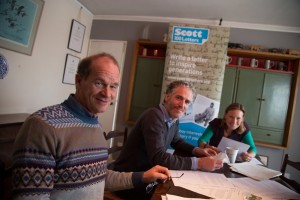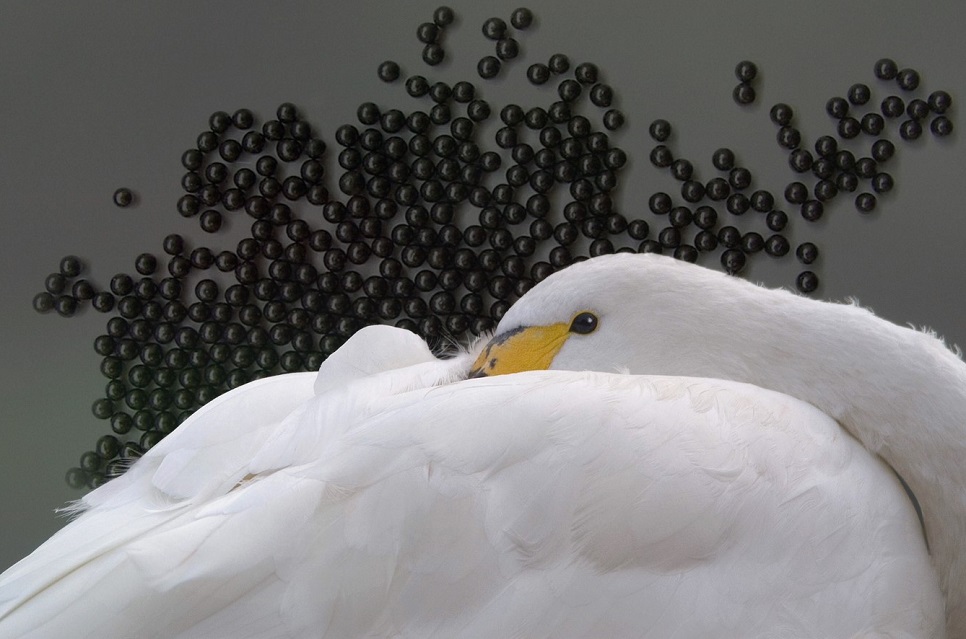Captain Scott letters competition inspires children
 Children are encouraged to switch off their computers and go and see the “immense variety” of wildlife in Britain, in the winning entry to WWT’s Scott 100 Letters letter-writing competition.
Children are encouraged to switch off their computers and go and see the “immense variety” of wildlife in Britain, in the winning entry to WWT’s Scott 100 Letters letter-writing competition.
Brent Astley Richards, 66, wrote the letter to inspire the next generation as part of our competition marking the centenary of Captain Scott’s expedition to the South Pole. Knowing he was about to die, Scott wrote to his wife and asked her to get their young son interested in nature.
Scott’s letter inspired his son Peter (Sir Peter Scott) to found WWT and to become a worldwide conservation pioneer and broadcaster who mentored Sir David Attenborough. 100 years later, the competition aims to use a simple letter to repeat that inspiration.
Mr Astley Richards’ letter to the children of Britain says: “Did you know we have the fastest creature on earth here in the UK and it can be seen in most cities? It’s the peregrine falcon and it can reach speeds of over 180mph. We have snakes, lizards, a moth that looks like a humming bird, a bird that walks along the bottom of rivers and one that flies nonstop for more than three years, all things that you could see. All you have to do is switch off your computer and go for a walk”.
Mr Astley Richards’ letter was one of 600 entries received online or at WWT’s 9 wetland visitor centres around the UK. Letters were written to family members, celebrities, politicians and groups.
The letters were judged by a panel of celebrity wildlife broadcasters including Kate Humble, Gordon Buchanan, Bill Oddie, Miranda Krestovnikoff, Chris Packham, Michaela Strachan and David Lindo.
Kate Humble is taking the top 100 letters, including Mr Astley Richards’, to Antarctica where she will post them to their recipients from the most southerly post office in the world. Each letter will include an Antarctica post stamp and include a covering letter personally signed by Captain Scott’s grandson, Falcon.
As overall winner, Mr Astley Richards also wins a family holiday for four to the Sani Beach Hotel, at an ecological reserve in Greece.
TV broadcaster and Scott 100 Letters judge Gordon Buchanan said:
“We have to inspire our youngsters to get close to nature, not just for their own benefit but also so that they will protect our environment in the future.
“All the judges found it was really difficult, but also a real privilege, to pick a winner from more than 600 inspiring entries. We felt Mr Astley Richards’ letter simply and clearly captured just how amazing Britain’s natural environment is and would give children the inspiration to go out and experience our national riches rather than miss out.”
“It’s mindboggling how Captain Scott’s letter, written thousands of miles away and a hundred years ago, has resulted all these years later in WWT saving endangered bird species around the world and running wetland visitor centres around the UK which get children close to nature. Just imagine what Brent Astley Richards’ letter might accomplish a hundred years from now?
Alongside the competition, WWT’s Inspiring Generations Appeal has raised more than £70,000 to enable disadvantaged schoolchildren to visit their centres and get close to nature, as its founder Sir Peter Scott intended.
The winning letter
Dear: Children of Great Britain
I am writing to you because:
You alone hold our future and indeed the future of all living things in your hands. Past generations have made a real mess of our planet but at long last we are all beginning to learn that we can and must make a difference. Over the last fifty years or so we have made great headway against the seemingly insurmountable problems of indifference, ignorance, political necessity and corporate greed but there is much still to be done. When I was a boy in the 1950’s most of our rivers were so polluted they held little if any wildlife, now most are clean and healthy and once again full of fish, we need to keep them that way. On the other hand in those days I could often hear the wonderful song of the Nightingale or wander through hay meadows full of wild flowers and butterflies, sadly much of that environment has since disappeared. We need to save as much as we can of what we have left and recreate those environments wherever possible.
In 2013 would you do one thing for me:
Many of you love your computers so to start with, look up wild birds, wild flowers, insects and wild animals and see what an immense variety surround us. Did you know for example that we have the fastest creature on earth here in the UK and it can be seen in most cities. It’s the Peregrine Falcon and it can reach speeds of over 180mph. We have snakes, lizards, bats, a moth that looks like a Humming Bird, a bird that walks along the bottom of rivers and one that flies nonstop for more that three years, all things that you could see. All you have to do is switch off your computer and go for a walk. But when you go for the walk take a long hard look at your environment. If you see a wild flower take a good look at it but don’t damage it, look at its shape its colour, the leaves and where it grows. Look at the birds, their colour, the shape of their beaks, did you know that the shape of the beak will often tell you what they eat. Fat beaks are usually for breaking into seeds, thin for eating insects, long for poking into tree bark or down into mud. When you finish the walk go home and write down the best bits and think what you could do to help our wild creatures.
This is important because:
The only creature on this planet capable of destroying it, is man. We all need to be aware that we survive because of the natural balance of nature, a balance we are in great danger of upsetting completely. You all hold the future of this planet in your hands and only you can determine its ultimate fate.
From: Brent Astley Richards

